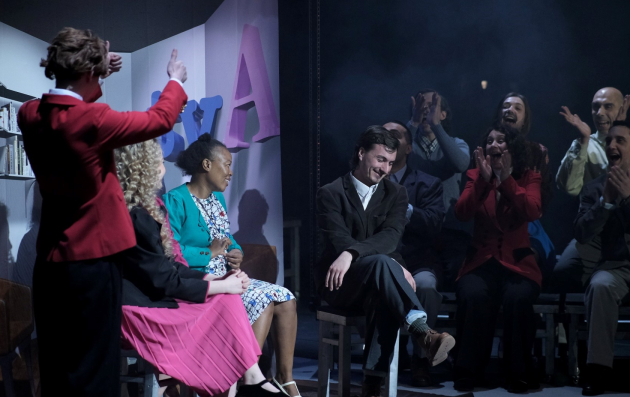Date of label : 29/10/2024
-
Schaerbeek , Belgium
-
Size of city : 131.993 inhabitants

This image captures a lively and theatrical moment at the SAME festival. The scene features a group of people, likely audience members or participants, seated in what appears to be an interactive or immersive performance setting.
Summary
The SAME Festival promotes equality in Schaerbeek (BE). Spanning two weeks, it includes conferences, theatre, accessible cinema, and more, focusing on racism, inclusion, and LGBTQIA+ issues. Organised with local associations and citizens in various cultural venues, the festival enhances visibility and creates synergies to amplify marginalised voices. The SAME Festival is organised by the municipality of Schaerbeek, and coordinated by the municipal Equal Opportunities Service. It aligns with the Urban Agenda for the EU Partnership on 'Cities of Equality'.
The solutions offered by the Good Practice
In 2022, the SAME Festival took place from 8 March (International Women's Rights Day) to 21 March (International Day against Racism and Xenophobia and International Down's Syndrome Day). In 2023, it took place from 8 to 21 March.
The festival supports Schaerbeek’s Equality Strategy by raising public awareness and helping associations that promote equal opportunities. It highlights the work of these associations and the municipal Equal Opportunities Service, fostering collaboration towards a more inclusive society for individuals, groups and institutions.
Key SAME Festival elements:
- Inclusive Environments: Utilises both popular and prestigious venues, mixing diverse audiences to build bridges and foster community.
- Intersectionality: Addresses overlapping discrimination, focusing on racism, gender, LGBTQIA+ rights, and accessibility.
- Community Engagement: Associations are active contributors in programming. For example, SAME 2021 hosted a photographic exhibition on Roma populations at the Halles de Schaerbeek venue.
- Accessibility: Entirely free, ensuring economic barriers do not prevent participation.
Specifically, it aligns with:
- Diverse Needs: Provides equal opportunities for all social groups.
- Legal Protections: Supports issues related to race, ethnicity, disability, gender, sexual orientation, and more.
- Urban Equality: Encourages balanced urban space use and social cohesion.
Building on the sustainable and integrated urban approach
The SAME Festival tackles urban challenges by adopting an integrated approach, simultaneously addressing environmental, economic, and social factors.
Environmental: Offers eco-friendly dining options, redistributes surplus food to local groups, and promotes sustainable public transport.
Economic: Supports the local economy by showcasing cultural centres, associations and local artists, thus stimulating regional economic activity and enhancing social connections.
Social: Promotes inclusion by offering accessible events, in partnership with local associations to ensure representation of diverse communities.
Moreover, the festival’s diverse and free programme makes culture accessible to all, fostering social cohesion and equality of opportunity. For example:
- Conferences include sign language translation.
- The programme indicates which venues are accessible for which type of disability, and is translated into Braille.
This holistic approach ensures that the SAME Festival significantly contributes to the sustainable and inclusive development of Schaerbeek.
Based on participatory approach
The SAME Festival embraces a participatory approach from start to finish, with the municipal Equal Opportunities Service collaborating closely with various partners:
- Local associations: Contribute to programming and execution, sharing their insights and expertise, and helping evaluate post-festival feedback.
- Youth centres: Members act as festival ambassadors, assist in programming, welcome attendees, and engage the public and inform them about events.
- Municipal authorities: Provide logistical and regulatory support, facilitate smooth event execution, and steer collaborative decision-making at various meetings.
- Local artists: Contribute to the cultural richness and diversity of the event.
International speakers: Participate in debates, bringing global perspectives to local issues, coming mainly from France.
By fostering collaboration, the festival ensures that it meets diverse community needs and enhances its local impact.
What difference has it made?
Before the SAME Festival, Schaerbeek had limited cultural diversity, few economic opportunities for local artists, and little focus on sustainability. After the festival, the Equal Opportunities Service observed a shift towards a more inclusive, diverse, and sustainable cultural landscape, with greater participation, economic benefits, and environmental awareness.
Economic: The SAME Festival supports local artists, performers, cultural centres and local businesses, directly benefitting them and revitalising the cultural scene, with a focus on equal pay for the invited artists.
Environmental: Sustainable practices raised awareness and promoted eco-friendly behaviours.
Social: Events brought together people from different social backgrounds, increased participation in cultural activities, and fostered social inclusion.
The festival creates a vibrant cultural scene, with an average of 30 events taking place over 10 days, attracting thousands of visitors annually. Evidence shows positive changes in attitudes, behaviours, and perceptions towards cultural diversity and inclusivity. Indicators of success include ongoing demand by young people for the festival, and a great appreciation for an event that focuses on gender equality, LGBTQ+ rights, and racial inclusion.
Why this Good Practice should be transferred to other cities
The SAME Festival promotes inclusive, engaged, and culturally accessible urban spaces, in line with European and international frameworks:
- SDG 10 (Reduced inequalities, SDG 11 (Sustainable cities and communities), and SDG 16 (Peaceful, just and inclusive societies).
- The EU Urban Agenda Partnerships on ‘Cities of Equality’ and ‘Culture and Heritage, and Territorial Agenda 2030, bying balanced urban space use and socially inclusive growth.
The SAME Festival aligns with Belgian policies on gender equality, anti-discrimination and promoting diversity. These fundamental principles facilitate its transfer to other European cities with similar values. Programming can be tailored to local cultural, social, and economic conditions, and to specific community needs. Successful transfer requires strong partnerships between local associations and authorities, community engagement, adequate funding, and political support.
In the Brussels-Capital Region, the City of Brussels and Saint Gilles have been inspired to replicate the SAME Festival practice. The Equal Opportunities Service also shares its experience through workshops and presentations, and partners with similar festivals in neighbouring regions, ensuring knowledge transfer and mutual support.
